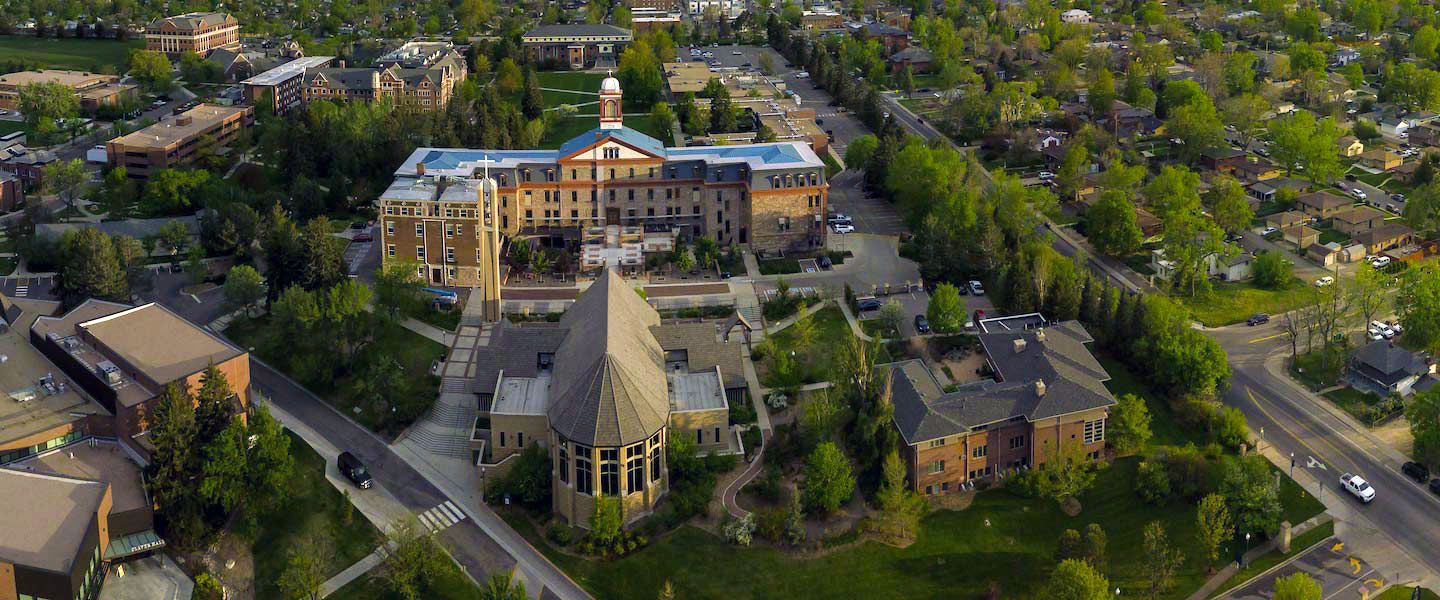
Human Resources
Includes Student Employment and PayrollLocation: Clarke Hall suite 269
Hours: Monday-Friday | 8:30 a.m. – 5 p.m.
Contact: 303.458.4161
hrinfo@regis.edu | studentemployment@regis.edu
Why Work at Regis?
At Regis University, we live (and work), our mission. As an employee of Regis, whether a member of faculty or staff, you will work each day knowing that your efforts help “build a more just and humane world through transformative education at the frontiers of faith, reason and culture.”
But what does that really mean? It means that every member of the Regis community is united by the intention to transform our students through an education that pushes them to examine the world critically and engage in their community with an open heart. Does that sound like something you could get behind? Well then, maybe Regis is right for your next career move.

Each Regis employee has a responsibility to perform their work in alignment with the mission of the University, especially with its Jesuit Catholic values. Each employee is expected to both contribute to and strengthen the university’s culture of respect and belonging for all members of our community. We welcome staff, faculty and students from all faiths and cultures and seek dedicated individuals to contribute to and strengthen our service to students. To learn more about how our mission, values and culture impact our students, check out our "Jesuit Educated" video.

We know benefits are important to an employee’s financial security and sense of wellbeing. We offer employees a competitive benefits package designed to enhance their quality of life. Eligible employees may participate in medical, dental, vision, retirement and disability plans, and take advantage of our generous paid leave policies. Check out our comprehensive Employee Benefits Summary for all the details.
It is the policy of Regis University to provide equal employment and educational opportunities to faculty, staff, students and applicants without regard to gender, race, color, religion, sex, marital status, national origin, age, disability, citizenship, sexual orientation, gender identity, veteran status, and any other groups protected by federal, state or local civil rights statutes. In addition, the University does not discriminate on the basis of genetic information in its employment policies and practices, including coverage under its health benefits program. The University complies with applicable state statutes and local ordinances governing nondiscrimination in employment and educational activities. All Regis University community members (faculty, students, staff, administrators, trustees, contract personnel, agents, visitors, guests, volunteers, and other individuals associated with the University) are prohibited from engaging in acts of discrimination based on the above categories toward other Regis University community members. Clubs, associations and other organizations (and their members) affiliated with or partaking in the benefits, services or privileges afforded by the University are required to abide by this policy. All University policies, practices and procedures are administered in a manner consistent with Regis University's Jesuit identity and character.
Regis University recognizes that Indigenous Peoples are the original stewards of the land we stand on today. We respectfully acknowledge that this land is the traditional homeland and buffalo hunting grounds of the Arapaho, Cheyenne and Ute Nations. We also recognize the 48 tribal nations that are historically tied to the lands that make up the state of Colorado.
As a Jesuit university, Regis is engaged in a mission of walking with those communities who have been excluded. Accordingly, it is important that we acknowledge that our presence on this land is due to the forced displacement of Indigenous Peoples from their ancestral lands. It is only in publicly recognizing this historical reality that we are able to embrace, in the present, our moral and intellectual responsibility and to affirm our commitment to a faith that does justice. In order to honor the original inhabitants of this land and to enter into right relationship with their descendants, Regis will continuously reimagine this acknowledgment, act on our responsibilities to the common good and respectfully collaborate with and support members of local Indigenous communities.
We also pause to acknowledge the labor upon which the prosperity of our country was built. We recognize that this nation has benefitted and profited from the labor of enslaved Africans as well as immigrant and refugee communities of color whose labor, whether voluntary, involuntary, trafficked, or forced, contributed to the building of this country and this state.
La Universidad de Regis reconoce que los pueblos indígenas son los administradores originales de la tierra en la que nos encontramos hoy. Reconocemos respetuosamente que esta tierra es la patria tradicional y fueron los terrenos de caza de bisontes de las naciones Arapaho, Cheyenne y Ute. También reconocemos a las 48 naciones tribales que están históricamente ligados a los territorios que constituyen el estado de Colorado.
Como universidad jesuita, Regis está comprometida en una misión de caminar junto a aquellas comunidades que han sido excluidas. En consecuencia, es importante que reconozcamos que nuestra presencia en esta tierra se debe al desplazamiento forzado de los Pueblos Indígenas de sus tierras ancestrales. Sólo al reconocer públicamente estas realidades históricas, podemos ser capaces de recibir y aceptar, en el presente, nuestra responsabilidad moral e intelectual, y afirmar nuestro compromiso con una fe que busca la justicia. Para poder honrar a los habitantes originales en estas tierras y para entrar en una relación adecuada con sus descendientes, Regis reimaginará continuamente estos reconocimientos, actuará de acuerdo a nuestra responsabilidad por el bien común, y se compromete a construir un entendimiento colectivo y fomentar conexiones auténticas con nuestras comunidades de color para lograr un cambio significativo.
También hacemos una pausa para reconocer el trabajo sobre lo cual se construyó la prosperidad de nuestro país.Reconocemos que esta nación se ha beneficiado del trabajo de los africano s esclavizados y de las comunidades inmigrantes y de refugiados de color cuyo trabajo, ya sea voluntario, involuntario, traficado o forzado, contribuyó a la construcción de este país y este estado.

Location: Clarke Hall suite 269
Hours: Monday-Friday | 8:30 a.m. – 5 p.m.
Contact: 303.458.4161
hrinfo@regis.edu | studentemployment@regis.edu